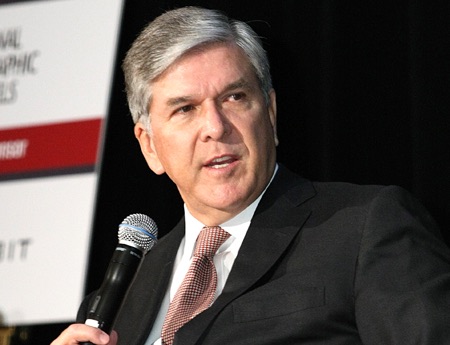Smith: Spectrum's Higher, Better Use Is Still Broadcasting

The smarter way to stay on top of broadcasting and cable industry. Sign up below
You are now subscribed
Your newsletter sign-up was successful
National Association of Broadcasters president Gordon Smith says that while viewers may like to catch a movie on Netflix or Amazon, when they want to catch a child abductor or be alerted to dangerous weather, they won't get it from video streaming services hungry for more bandwidth.
Speaking at the America's Public Television Stations Public Media Summit in Washington Monday, Smith was making the point that, arguably, "there is no 'higher and better use of spectrum' than serving diverse audiences with free and local TV programming for all citizens, and not just to those who can just afford a pay TV package."
The upcoming broadcast incentive auction, where TV spectrum is being reclaimed for resale, the FCC is presuming that the highest, best use of spectrum will be for wireless broadband.
Smith pointed out that while broadcasters have a public interest obligation, online services do not. "Everyone wants what we have – our airwaves. But, none of our competitors want the same responsibilities that come with being a broadcaster," he said, according to a text of the speech.
He said that none of the Internet services buying broadcast spectrum will be offering content "to the masses free of charge," which is what both public and commercial TV stations do.
And the content won't be local. "A lot of people enjoy catching a movie or show on Netflix or Amazon Prime," said Smith, "but when was the last time you watched a Snowzilla blizzard covered by Netflix? When was the last time an Amber Alert child was rescued by Amazon?"
Smith invoked noncommercial WHUT in Washington, which is owned by Howard University. That station may be offered up for sale in the auction. Smith said the station provides "immeasurable value in our nation's capital," he said.
The smarter way to stay on top of broadcasting and cable industry. Sign up below
Smith also took aim at the FCC's proposal to reserve channels post-auction for unlicensed use, further reducing the options for new TV stations or LPTVs and translators not protected in the repack.
"[T]he agency has proposed gifting some channels to big companies like Google and Microsoft. Not only could this hurt rural and diverse audiences, but it also sends a clear message to Google that they don’t have to participate in the auction to secure spectrum."
Pulling out all the stops in arguing for the value of spectrum in broadcasters' hands, Smith suggested they welcome their public interest obligations, and said they have "embraced" "decency rules"—the FCC's ability to regulate broadcast content.
And while T-Mobile just last week told the FCC it should be able to repack TV stations at or under the $1.75 billion it has been given by Congress as a fund to compensate broadcasters (and some cable operators), Smith insisted that was not the case.
"[O]ur best engineers say that number is too low. In fact, it may be as much as $1 billion short."
Smith said broadcasters would "work with Congress" to make sure there was enough money to go around. NAB early on tried to get the FCC to commit to that figure as a budget, meaning it would clear no more stations than it could pay for, but the commission would not go along with that interpretation.
Contributing editor John Eggerton has been an editor and/or writer on media regulation, legislation and policy for over four decades, including covering the FCC, FTC, Congress, the major media trade associations, and the federal courts. In addition to Multichannel News and Broadcasting + Cable, his work has appeared in Radio World, TV Technology, TV Fax, This Week in Consumer Electronics, Variety and the Encyclopedia Britannica.

